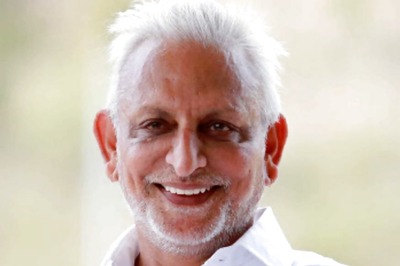
views
Coinciding with the high-profile change of Twitter ownership to billionaire Elon Musk, India this week notified new rules under which it will set up appellate panels to settle grievances that users may have against decisions of social media platforms like Twitter and Facebook on hosting contentious content.
The three-member Grievance Appellate Committee(s) will be set in three months, according to the gazette notification issued on Friday. In an exclusive interview to News18, Union IT Minister Rajeev Chandrasekhar said the latest amendments had no link to the changes at Twitter and that the move was in the works since March this year.
Reiterating the Narendra Modi government?s aim to protect ?digital nagriks? (netizens), the minister said big tech companies operating in India would have to abide by Indians? constitutional right to non-discrimination, right to free speech and right to privacy irrespective of where they may be headquartered.
He added that social media networks will have to remove any ?misinformation? or illegal content or content that promotes ill-will between different groups on the grounds of religion or caste with the intent to incite violence within 72 hours of being flagged.
Edited excerpts:
Why was this necessitated and does it have to do with the management change in Twitter?
No. I want to draw your attention to the fact that the amended IT rules have been under consultation for about four to five months now. And we commenced these consultations in March-April of 2022. As I have said repeatedly, the jurisprudence and laws and rules in the internet and tech space will continue to evolve.
In May 2021, we had the IT rules that were notified then. One of the important elements of that was to improve the accountability relationship between intermediaries and the digital nagriks who use the platforms. A grievance address mechanism and grievance officers were suggested to be appointed. We have noticed since May 21 that that grievance address mechanism has not worked satisfactorily. And we have received hundreds and thousands of messages from digital nagriks that either the platforms don?t respond, or if they respond, it?s a very token approach towards addressing grievances.
In the Modi government, openness, safety, trust and accountability are the broader boundary conditions by which we do all the policies and rules around the internet. On accountability, we believe that there was a gap, and that is why we have brought the grievance appellate committee structure, which allows every consumer who?s dissatisfied with the grievance address process of the intermediary to appeal.
What is the larger philosophy? How will the new rules change the social media dynamics from an Indian user point of view?
Well, the guiding philosophy, like I said, is that everything that the government of India does is towards its duty to deliver an open, safe, and trusted internet to all digital nagriks. The amended IT rules deal with two of these issues. It deals with the accountability issue and talks about improving the safety and trust of the internet with a rule rewrite, where there is now a casted obligation, an expanded casted obligation on the intermediaries, on the issue of the types of content their content moderation policies should prohibit.
And we have talked about illegal content pornography, anti-national security sensitive content. We have talked about misinformation. And we?ve also talked about content that will incite ill-will between communities.
#Exclusive: "Everything that the govt of India does is to deliver open, safe, trusted and an accountable internet to all digital naagriks (citizens)": Union Minister Rajeev Chandrasekhar (@Rajeev_GoI) speaks to News18's @maryashakil#OnlineSafety #ITRules #Internet #India pic.twitter.com/mdMCf9VYZX? News18 (@CNNnews18) October 29, 2022
We believe, that as a consequence of these rules, intermediaries working with the government will make the internet and internet intermediaries operating on the internet much safer, much more trusted by the 80 crore Indians who are using it today. And the 120 crore Indians who will use it by 2025-2026. There is now a lot more obligation on the internet intermediary in terms of their role in ensuring illegal and misinformation content is prohibited or taken down from these platforms.
And even if they miss the opportunity the first time around, they are given an option to take it down in 72 hours after a misinformation or insightful content or illegal content is reported to them. So I think that is a very important step in making intermediaries partners with the government in making sure their platforms are safe and trusted platforms for all Indian citizens to use.
We have seen time and again that big tech companies simply do not comply with regulations. How will you ensure they do so?
No, it?s very simple. The rules basically say you have to do this, and you have also got to, and you missed one… One addition to the amendment that we have issued yesterday is that no platform can violate Article 14, 19 or 21 constitutional rights of any Indian citizen regardless of where the jurisdiction of the platform is.
So if you read these two amendments together and read it as being mandatory for all those platforms who want to enjoy the status of being an intermediary… If they don?t comply with them, then automatically they lose the status of being an intermediary, and therefore do not enjoy this Section 79 protection under the IT Act from prosecution that they enjoy today.
So if you want to be an intermediary, these are the rules and responsibilities that you follow. If you want to be a responsible intermediary and a partner with the government in creating a safe and trusted space, you follow these rules. If you don?t intend to be a partner with the government of India or partner with the Indian ecosystem in creating a safe and trusted internet for all Indians, then you can choose the route of not being intermediary, and therefore not enjoying the safe harbour under Section 79.
But the big tech companies have been advocating self-regulation. Do you think the amended rules will strengthen the grievance redressal mechanism?
I?m hopeful because the current grievance address mechanism, which is really a self-regulatory mechanism… the government gave the power to the intermediaries in May 2021 that they appoint the grievance officers, they address the grievances of the digital nagriks. The results have not been satisfactory. So the government has to step in.
I personally believe that, and I?ve said this repeatedly during consultations and meetings with the industry, that the government has no interest in sitting in the GSE; that we hope that the formation of the GSE will signal to the platforms and the intermediaries that they must do a better job of dealing with grievances at their level. Because if they do a better job at their level, no appeals will come to the GSE.
Will the amended #ITRules strengthen the Grievance Redressal Mechanism? "I'm hopeful," says Union Minister Rajeev Chandrasekhar (@Rajeev_GoI). He also talks about how the will government ensure compliance@maryashakil | #Exclusive #OnlineSafety pic.twitter.com/3RLGE9db5z? News18 (@CNNnews18) October 29, 2022
The problem of appeals comes from dissatisfied consumers, dissatisfied digital nagriks, who believe that platforms are not listening to them. I am meeting platforms extensively, explaining to them that we really need to make this a partnership. The goal of a safe and trusted internet is not a goal for the government of India. It is a goal for 1.2 billion Indians. It?s a goal for a trillion-dollar digital economy, and it?s a goal for jobs, investments that will create a $5 trillion economy for our nation.
The amendments actually provide for social media platforms to acknowledge user complaints about objectionable content within 24 hours and resolve them within 15 days thereafter. The rules actually provide for social media platforms to take down certain contentious content within 72 hours of reporting. Do you expect big tech to adhere to this?
I hope that will change and that is the intention. The Prime Minister has made it very clear that the relationship of accountability between business and consumers is a relationship that the government takes very seriously. We consider it our duty to the citizens to ensure that the accountability relationship works. And we hope that this grievance committee structure, these amended rules are a good signal to the intermediaries. I will engage with them deeply. This is a joint mission for the government, the citizens, and all of those who conduct business on the internet. A large part of the intermediary community sees it that way. There are some outliers, and I hope the outliers will join the mainstream and do what is expected of them.
Will we be able to get big tech companies to adhere to sovereign rules and not constantly allude to their community guidelines?
That is precisely why we have embedded in the rules very unambiguously that no platform, no intermediary, regardless of the jurisdiction? If that platform is serving Indian consumers, that platform cannot violate any of the constitutional rights of any Indian citizens. And for explicit purposes, we have said Article 14, 19, and 21 ? right to non-discrimination, right to free speech and right to privacy ? cannot be violated by any platform regardless of their community guidelines, regardless of where their jurisdiction of origin or domicile is. We have put it in the rules.
"We've put it in the rules that Right to non-discrimination, free speech and privacy of Indian citizens cannot be violated by any platform regardless of their community guidelines": Union Minister @Rajeev_GoI tells News18's @maryashakil#Exclusive #ITRules #OnlineSafety pic.twitter.com/Q9DximDpxs? News18 (@CNNnews18) October 29, 2022
The government of India under Prime Minister Narendra Modi is a trustee of the constitutional rights of every citizen, including digital nagriks and citizens who are connected to the internet. And we take that duty very seriously. And that is why the IT rules today unambiguously have a specific formulation that no platform can violate the constitutional rights of any Indian citizen.
How hopeful are you that the new rules will ensure suitable safeguards for digital nagriks, as you call them?
I am optimistic because this narrative, this vision of our PM, of having an open, safe, and trusted and accountable internet is now being echoed by many other countries around the world, including, most recently, the US. This issue of safety and trust is taking centre-stage because the internet was seen for many, many years as a force of good and it is a place where good things happen.
But we have realized in the last several years that it is also a place where a lot of user harm, lot of targeting, lot of misinformation, lot of incitement happens. We are the largest connected democracy in the world today and we will be the largest connected nation by 2025 with 120 crore Indians online. So, in a lot of ways, we are playing the leadership role and showing the way to the world by making our cyber space a safe and trusted space.
Read all the Latest India News here




















Comments
0 comment